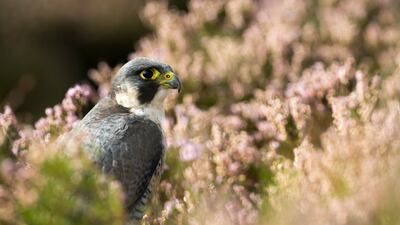Bahrain’s royal family is planning to launch a “seven-star breeding project” for peregrine falcons at a farm in North Yorkshire, UK, where birds of prey will be born and raised before being transported to the Gulf.
The ruling Al Khalifa family have enlisted the help of British falcon expert Dr Mark Robb to open a centre to meet high demand for the birds.
An application submitted to Hambleton District Council in North Yorkshire laid out the Bahraini royals’ ambitions to open the centre in Easingwold, which will hold public open days and educational talks for school groups.
The move comes after Bahrain joined a global movement to control the importation of endangered species of animals.
Dr Robb, who has decades of experience in breeding falcons, set up a breeding centre in nearby Stokesley two years ago and staff will be enlisted to help establish the new site.
While falconry has historically been a part of the culture of many Middle Eastern nations, the birds have surged in popularity in recent years.
The application shows how the royals favour Yorkshire for their project as the climate is more suitable for successful breeding of the birds compared to other parts of Britain.
The documents state that the farm “offers everything a falcon breeding project can hope for” as it is located in a semi-rural, flat area, which is “well shielded from sight from all angles”.
The applicants laid out how there are sufficient trees on the land and foliage for natural drainage.
“The trees surrounding the fields also provide sufficient vegetation for natural drainage of the ground and oxygen exchange/water evaporation on hot days,” the application said.

“This will not be an overnight success, it will require imprinting of new falcons, importation of suitable breeding stock as well as many hours of work.
“At the moment we have eight full-time employees at the site in Great Broughton.
“Two of these people will come with us to the new site as we are now depending on them to be able to get the new project up and running to the quality that our Bahrain clients require.
“We both feel that our new position is further away from less reputable parts of Middlesbrough and we hope that this in itself will give us a natural protection from local foul play.
“We have been informed that the royal family of Bahrain want a seven-star breeding project, the only one of its kind from Bahrain.”
It went on to say that breeding falcons in captivity is “extraordinary complicated and time consuming” and is particularly challenging compared to other breeds.
Submitting the application on behalf of the Bahraini royals, Dr Robb spelt out the complexities involved in breeding falcons.
"Most other animals breed as a natural part of their life cycle," he said. "However, falcons need certain conditions to be able to comfortably breed inside an aviary.
"Falcons also tend to be very picky with their partner. Just because we as breeders want that exact pair of birds to breed, it might not mean that the birds agree.
"This is why we imprint falcons and breed from them, with us as a 'middle hand' between the male and the female."
Dr Robb said that in addition to falcons bred through imprinting, there is also demand from Gulf customers for naturally-bred birds.
"This is because the falcons flown by the clients in the Gulf need to behave like wild falcons and not like imprinted falcons," he said.
"This means that any of the young birds that are to be exported for hunting need to be reared by a pair of falcons and not by humans. For a falcon to thrive in captivity, you need to enable them to perform their natural behaviours. One of these is, of course, to be able to fly."
There have been no objections to the proposal and Hambleton District Council’s planning committee is expected to approve the application at a hearing on Thursday.
A report compiled for the committee said the breeding centre would create jobs for local people and “therefore be able to contribute to economic growth”.


